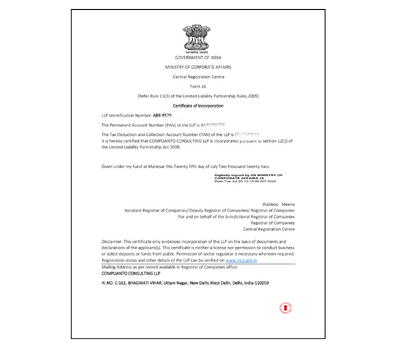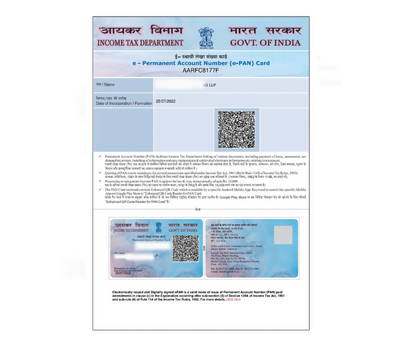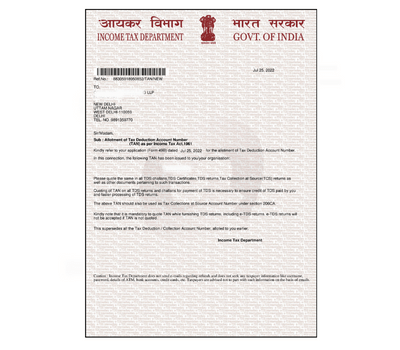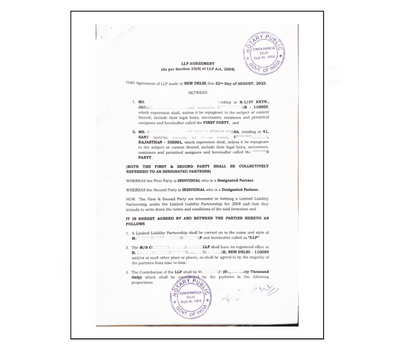Apply LLP Registration Online in India
with us At just Rs.5999
(All Inclusive)
Get Your LLP Registration done in 15 days.
What all you get
LLP Name Approval
TAN
2 Digital Signature
2 DIN
LLP Certificate of Incorporation
LLP Agreement
PAN
CA assistance
*Contact our team for discounts & offers
LLP Registration
Our Incorporation Support Covers
We will provide assistance in obtaining all the below documents as part of private limited company registration .
Below are all Sample Certificates for Illustrative Purposes Only. Final documents are issued by the respective government authorities.
OUR PROCESS FOR
LLP Registration

Step-1
FILL FORM

Step-2
DISCUSS WITH OUR EXPERTS

Step-3
SHARE DOCUMENTS

Step-4
DELIVERY OF CERTIFICATE
OUR PROCESS FOR
LLP Registration

Step-1
FILL FORM

Step-2
DISCUSS WITH OUR EXPERTS

Step-3
SHARE DOCUMENTS

Step-4
GET CERTIFICATE
What is
Limited Liability Partnership ?
Limited Liability Partnership as its name suggest is a form of partnership with limited liability. It carries the features of both a partnership firm and company. LLP is governed by Limited Liability Partnership Act, 2008 and it began in January 2009 and quicky became popular due to lesser compliances as compared to company and similar transparency as it is registered with ROC.
Limited Liability Partnership is formed by minimum two designated partners one of whom should be residing in India. LLP is governed by an agreement which is called Limited Liability Partnership Agreement carrying rights and duties of the partners.
This form of governance is mostly popular amongst the professionals like lawyers, architects, Interior designers, IT professionals and small businesses who want to work under legal structure to ensure transparency. limited liability partnerships have a separate legal existence and identity from their participants. Furthermore, its partners are only liable to a limited extent.
LLPs are accepted form of business for startup India Registration and thereby gets benefits under the same.
What is
Limited Liability Partnership ?
Limited Liability Partnership as its name suggest is a form of partnership with limited liability. It carries the features of both a partnership firm and company. LLP is governed by Limited Liability Partnership Act, 2008 and it began in January 2009 and quicky became popular due to lesser compliances as compared to company and similar transparency as it is registered with ROC.
Limited Liability Partnership is formed by minimum two designated partners one of whom should be residing in India. LLP is governed by an agreement which is called Limited Liability Partnership Agreement carrying rights and duties of the partners.
This form of governance is mostly popular amongst the professionals like lawyers, architects, Interior designers, IT professionals and small businesses who want to work under legal structure to ensure transparency. limited liability partnerships have a separate legal existence and identity from their participants. Furthermore, its partners are only liable to a limited extent.
LLPs are accepted form of business for startup India Registration and thereby gets benefits under the same.
REGISTRATION PROCESS FOR
LIMITED LIABILITY PARTNERSHIP(LLP)
The registration process of an LLP is done under the Ministry of Corporate Affairs (MCA) .Given below are the steps involved:
Get help from our Experts for your Company Registration!
- Step 1 - Apply for DSC
- Step 2 - Application for DPIN
- Step 3 - LLP Name Approval
- Step 4 - Incorporation of LLP
- Step 5 - Filing of LLP Agreement
Apply for DSC
Obtaining a Digital Signature is the first step of an online LLP registration process. A DSC or a Digital Signature Certificate works as a proof of identity for the designated partners. All designated partners must have Class-3 digital signature certificates.
Application for DPIN
The second step is to apply for a DPIN.
DPIN, or Designated Partner Identification Number, is a unique number assigned by the Ministry of Corporate Affairs (MCA) to designated partners of LLP(Limited Liability Partnership). This unique identification number possesses lifetime validity.
LLP Name Approval
Next step is to file LLP RUN form for reservation of the name of the proposed LLP. It is recommended that the names should not be similar, identical or phonetically similar to existing LLPs,companies,firms or Trademarks.
Incorporation of LLP
For Incorporating LLP,FiLLIP form needs to be filed which needs below details.
- Address of the registered office.
- ROC
- Business activity code
- Details of Designated Partners
- Contribution of Designated Partners
Filing of LLP Agreement
After Incorporation ,LLP Agreement needs to be drafted that governs the mutual rights between designated partners. LLP Agreement must be created within 30 days of the date of incorporation.
- LLP agreement must be printed on stamp paper
- LLP agreement also needs to be filed online in Form-3 on the MCA Portal
- Designated Partner's details needs to be filed in Form-4 on the MCA portal
REGISTRATION COST FOR
LIMITED LIABILITY PARTNERSHIP(LLP)
The registration cost of an LLP is based on the amount of capital contribution .Given below are the cost involved in registering a LLP:
| S.No. | Capital Contribution in INR | Our Fee in INR |
|---|---|---|
| 1 | Up to 1,00,000 | 5,999 |
| 2 | More than 1,00,000 up to 5,00,000 | 7,499 |
| 3 | More than 5,00,000 up to 10,00,000 | 9,499 |
| 4 | More than 10,00,000 | 10,499 |
Benefits of
Limited Liability Partnership
Below are the Benefits that you get in Limited Liability Partnership (LLP) Registration over Private Limited Company or Partnership Firm
Better Image And Credibility
Since there is transparency due to govt. regulations, private limited company is mostly preferred by the corporate clients, investors, lenders and vendors, as compare to Proprietorship or partnership firm.
No Minimum Capital Required
LLP can be started with the minimum amount of money and therefore suitable for bootstrapped startups.
Ease Of Fund Raising
Due to its legal existence a LLP enjoys more access to fund from banks and angel investors, which is difficult in other forms of business.
No Compulsory Audit
Unlike Private Limited Company, a LLP is only required to get its books & accounts mandatorily audited if:
- the Capital contributions of the LLP exceeds Rs. 25 Lakhs, or
-When annual turnover of the LLP exceeds Rs. 40 Lakhs
Lesser Compliances
The LLP has to face a lesser compliance burden as it has to submit only two statements, namely the Annual Return and Statement of Accounts and Solvency. On the other hand, a private company requires a minimum of 8 to 10 regulatory formalities and compliances.
No Dividend Distribution Tax
If the partners of LLP withdraw profits from the company, an additional tax liability in the form of DDT is not payable by partners. Whereas, in the case of a company, the owners have to pay DDT @ 15% ( surcharge& educational cess).
Benefits of
Limited Liability Partnership
Below are the Benefits that you get in Limited Liability Partnership (LLP) Registration over Private Limited Company or Partnership Firm
Better Image And Credibility
Since there is transparency due to govt. regulations, private limited company is mostly preferred by the corporate clients, investors, lenders and vendors, as compare to Proprietorship or partnership firm.
No Minimum Capital Required
LLP can be started with the minimum amount of money and therefore suitable for bootstrapped startups.
Ease Of Fund Raising
Due to its legal existence a LLP enjoys more access to fund from banks and angel investors, which is difficult in other forms of business.
No Compulsory Audit
Unlike Private Limited Company, a LLP is only required to get its books & accounts mandatorily audited if:
- the Capital contributions of the LLP exceeds Rs. 25 Lakhs, or
-When annual turnover of the LLP exceeds Rs. 40 Lakhs
Lesser Compliances
The LLP has to face a lesser compliance burden as it has to submit only two statements, namely the Annual Return and Statement of Accounts and Solvency. On the other hand, a private company requires a minimum of 8 to 10 regulatory formalities and compliances.
No Dividend Distribution Tax
If the partners of LLP withdraw profits from the company, an additional tax liability in the form of DDT is not payable by partners. Whereas, in the case of a company, the owners have to pay DDT @ 15% ( surcharge& educational cess).
List of Documents Required for
LLP Registration
Below are the documents required for the process of Limited Liability Partnership Registration
- Partner’s Photo
- Partner’s PAN and Aadhaar
- Latest Bank Statement with Address
- Rent Agreement or Ownership Proof
- Latest Electricity Bill
- NOC from Owners (If not rented)
- Digital Signature Certificate (DSC)
- Director Identification Number (DIN) if any proposed director already having
Important points to consider
For LLP Registration
Below are the important points to consider for Limited Liability Partnership Registration
- Minimum 2 Indian designated partners required
- The partners and designated partners can be same person
- If any of the designated partner is already having DIN/DPIN then provide the same
- LLP agreement should be properly nortarized and signed by witnesses.
- All KYC documents should be self attested and Electricity bill/telephone bill and Bank statement should not be more than 30 days old.
- Rent agreement should be in the name of the proposed designated partner only. (Rent agreement in the name of proposed LLP is not acceptable
- Rent agreement should contain witnesses and KYC of the designated partners to be part of agreement with notary attested
- Govt. Fee and Stamp duty changes with change in capital and state of incorporation.
Statewise Cost of
Stamp Duty for LLP Registration Across india
Cost varies statewise due to variation in government fee and stamp duty. Click or Hover over specific state to know the Stamp Duty on capital upto Rs.1 lakh !
WHY COMPLIANTO
ACCESSIBILITY
We provide convenient communication channels for clients to reach out and get support when needed.

Transparent Pricing
We offer transparent and affordable pricing, without any hidden fees or charges, making it easier for clients to budget and plan. (Govt. fees charge on actuals)

Confidentiality
Our services will be executed through confidentiality agreements . Your company’s information and trademarks will be kept secret with us

Expertise
We have a team of qualified and experienced professionals who can provide high-quality financial and business advisory services to clients.

Personalized Services
Our Service solutions can be tailored to the unique needs of each client, rather than a one-size-fits-all approach.

Prompt Response
We provide regular updates and proactive communication to clients, keeping them informed and involved in the decision-making process.
Get Free Consultation
LLP Registration
Have A Question?
FREQUENTLY ASKED QUESTIONS (FAQs)
A Limited Liability Partnership (LLP) is a hybrid form of business organization that combines the features of a partnership and a company. It provides the benefits of a partnership, such as flexibility and tax benefits, along with the advantages of a limited liability company, which protects the personal assets of partners from business liabilities.
In a traditional partnership, the partners have unlimited personal liability for the debts and obligations of the business. In an LLP, the liability of partners is limited to their agreed contribution to the LLP. Additionally, an LLP has a separate legal entity, and the partners are not liable for the misconduct or negligence of other partners.
Some of the benefits of forming an LLP are:
- Limited liability protection for partners
- Flexibility in management and operations
- Lower compliance requirements compared to a company
- Tax benefits similar to a partnership
- Easy to form and dissolve
Any two or more individuals or companies can form an LLP. There is no limit on the maximum number of partners in an LLP.
The process for registering an LLP in India involves the following steps:
- Obtain a Digital Signature Certificate (DSC) for the partners.
- Obtain a Designated Partner Identification Number (DPIN) for the partners.
- Reserve a name for the LLP.
- File the incorporation documents with the Registrar of Companies (ROC).
- Obtain the Certificate of Incorporation from the ROC.
Some of the compliance requirements for an LLP in India are:
- Annual filing of LLP agreement and statement of accounts and solvency with the ROC.
Appointment of an auditor if –
-the contributions of the LLP exceeds Rs. 25 Lakhs, or
-When annual turnover of the LLP exceeds Rs. 40 Lakhs
- Maintenance of proper books of accounts and records.
- Compliance with income tax and other applicable laws.
Yes, an LLP can be converted into a company or vice versa, subject to the provisions of the Companies Act, 2013.
Yes, an LLP can raise funds from external sources such as banks and financial institutions. However, an LLP cannot issue shares to the public like a company.
Yes, an LLP can raise funds from external sources such as banks and financial institutions. However, an LLP cannot issue shares to the public like a company.
An LLP does not have permission to form for any business activity as it is not allowed to carry out activities such as banking, insurance, and investment banking.
If all the documents are in order then it takes 10-15 working days to register a LLP.
Selecting a name for your LLP is an important decision as it represents your brand and identity. Here are some steps you can follow to choose a name for your LLP:
1.Reflect your brand: The name should align with your brand and convey the right message to your customers.
2. Make it unique: Conduct a thorough search to ensure that the name you choose is not already in use by another company in your industry. This helps you avoid legal conflicts and confusion among customers.
3. Be memorable and easy to pronounce: Select a name that is catchy, easy to remember, and easy to pronounce.
4. Consider domain availability: In today's digital age, it is important to have an online presence. Check the availability of domain names that match or closely resemble your LLP name.
5. Check trademark registrations: Conduct a search to see if the name you want to use is already trademarked. This will help you avoid potential legal issues in the future.
6. Consider future growth: Ensure that the chosen name is broad enough to accommodate future expansion into different products, services, or geographic regions, if applicable.
7. Register the name: Once you have finalized a name, you can get approval of the name with Registrar of Companies.
Remember, choosing a name is a creative process, and it's important to take your time and consider multiple options before making a final decision.
Yes, it is mandatory to have a registered office for registering a LLP. Office can be rented, owned or even co-working space.
Since a LLP is a separate legal entity, it’s liable to the full extent of its assets but liability of the partners is limited to their agreed contribution in the LLP. The LLP can continue its existence irrespective of changes in partners. It is capable of entering into contracts and holding property in its own name.
Any LLP can close down its business by adopting any of the following two ways:
Voluntary Strike Off
A Limited Liability Partnership (LLP) can voluntarily apply to the Registrar of Companies (ROC) for striking off its name from the register of LLPs. The LLP must meet the following conditions to be eligible for voluntary strike off:
• The LLP must not be carrying on any business or operations for a period of one year or more.
• The LLP must have no outstanding liabilities.
• All partners of the LLP must consent to the strike off.
The LLP can apply for voluntary strike off by filing Form 24 with the ROC. The form must be accompanied by the following documents:
• A statement of account disclosing nil assets and nil liabilities, certified by a Chartered Accountant in practice.
• A copy of the latest income tax return.
• A copy of the LLP agreement.
• A copy of the consent of all partners.
Once the ROC receives the application, it will publish a public notice inviting objections to the strike off. If no objections are received within 30 days, the ROC will strike off the name of the LLP from the register.
Compulsory Strike Off
The ROC can also strike off the name of an LLP from the register if it believes that the LLP is defunct. An LLP is considered to be defunct if it has not carried on any business or operations for a period of two years or more.
If the ROC decides to strike off the name of an LLP, it will send a notice to the LLP and all its partners. The notice will give the LLP an opportunity to make representations against the strike off.
If the LLP does not make any representations, or if the representations are not satisfactory, the ROC will strike off the name of the LLP from the register.
Like private Limited Company , there is no requirement for minimum capital for registering a LLP.
The LLP has to file ITR-5.
A: Any individual or body corporate can be a partner in an LLP in India. However, there are some restrictions on who can be a partner in an LLP.
The following persons cannot be partners in an LLP:
• A minor
• A person who is declared insolvent
• A person who is convicted of a crime involving moral turpitude
• A person who is a member of a cooperative society registered under the Cooperative Societies Act, 1912
• A person who is a government servant
In addition, the following persons cannot be designated partners in an LLP:
• A person who is not a citizen of India
• A person who is not a resident of India
• A minor
• A person who is declared insolvent
• A person who is convicted of a crime involving moral turpitude
A designated partner is a partner who is responsible for the compliance of the LLP with the provisions of the Limited Liability Partnership Act, 2008.
Here are some additional details about the eligibility requirements for partners in an LLP:
• Individuals: Individuals who can be partners in an LLP must be at least 18 years old and have the capacity to enter into a contract.
• Body corporates: Body corporates that can be partners in an LLP must be incorporated under the Companies Act, 2013 or any other law for the time being in force in India.
• Designated partners: Designated partners must be individuals who are citizens of India and residents of India. They must also be at least 18 years old and have the capacity to enter into a contract.
A Limited Liability Partnership (LLP) Agreement is a written contract between the partners of an LLP that sets out the terms and conditions of their relationship. LLP agreement is the by laws which governs the functioning of a LLP.
The LLP Agreement should cover the following topics:
• The name of the LLP
• The address of the LLP
• The nature of the business that the LLP will carry on
• The contributions of the partners
• The profit and loss sharing ratio
• The management of the LLP
• The admission and retirement of partners
• The dissolution of the LLP
Yes, an LLP can change its registered office address after its registration. The procedure for changing the registered office address is as follows:
1. The LLP must obtain the consent of all the partners.
2. The LLP must file Form 15 with the Registrar of Companies (ROC).
3. The LLP must publish a notice of the change of address in a newspaper.
4. The LLP must update its registered office address on all its documents, including its website, letterhead, and signboard.
The ROC will process the application for change of address within 30 days. If the application is approved, the ROC will issue a new registration certificate with the new address.
No, the whole process is online. If all the documents are in order then we can process your application in online mode only.
You manage business, we manage your compliances
Our team is constantly working towards the highest level of compliance solutions for you.
GET FREE CONSULTATION


(Mentorcorp Private Limited) is a privately owned consultancy firm. We (https://compliantoconsulting.com) are not a government website and are not associated with, authorized by, or representing any government body.
We do not issue, provide, or guarantee any government documents, registrations, licenses, or certificates. Our role is strictly limited to professional consultancy, advisory, and documentation support only.
All government applications, approvals, and official services are processed exclusively by the respective Government authorities. Any fees charged by Mentorcorp private limited are solely for consultancy services.
Copyright @ MENTORCORP PRIVATE LIMITED. All rights reserved








